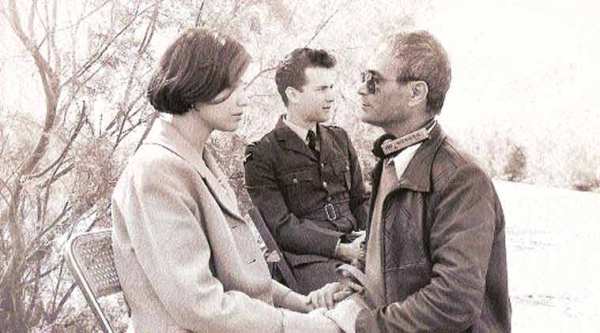Stay updated with the latest - Click here to follow us on Instagram
‘If your story is not about love, then there is no need to tell it’
Many filmmakers have inspired me, mainly American filmmakers like John Ford.
 Moshe Mizrahi with Cristina Marcillac and Tom Hanks in Every Time We Say Goodbye; a still from I Love You Rosa; the director.
Moshe Mizrahi with Cristina Marcillac and Tom Hanks in Every Time We Say Goodbye; a still from I Love You Rosa; the director.
Israeli filmmaker Moshe Mizrahi straddles French and Israeli cinema with ease. The three-time Oscar nominee received the Best Foreign Film from the Academy for his French film, Madame Rosa (1977), his most recent being the A Weekend in the Galilee (2007). Ahead of his film screening in the city, the 83-year-old, over a phone conversation from Israel, talks about the importance of love in cinema, women, and his fascination with the name “Rosa”. Excerpts:
When did you decide that you wanted to be a filmmaker?
When I was 15, my father took me to a cinema hall in Alexandria, Egypt. That was the first time I had watched a movie; it was a popular American action film. That experience was very important for me and I wanted to know everything about cinema from that moment on. I would find all kinds of ways to go to the movies, sometimes, even skip school. The classic American films of the ’30s were a big influence. It was only much later that I started to think about how films are made.
Most of your films have strong female characters, who are dealing with some form of tragic love. Why is that?
In the beginning, I wanted to make films like American action ones. But later I understood that children and women are two parts of society that are most exploited and I wanted to make films around them. Women have been an important part of my family’s culture, and the Jewish culture, since my forefathers opted for exile from Spain in the 15th century. My family spoke Ladino (Judezmo) the language of the Spanish Jews. In our culture, a strong woman influences her children. In my films, the females are not tragic. They have an ability to live their life around their need for love. I am interested in the mysterious ways of love and the quality of grace that comes in adults when they feel loved. If your story is not about love then there is no need to tell it.
What were the inspirations behind your stories?
Many filmmakers have inspired me, mainly American filmmakers like John Ford. I also watched Satyajit Ray’s films, especially Pather Panchali (1955). The character of the 12-year-old boy, Nessim, in I Love You Rosa is based on Apu.
Your 1971 film Les Stances A Sophie was described as a landmark film due to its resonance with the French New Wave cinema. Were you influenced by this movement?
I knew the author Christiane Rochefort and she gave me the rights to adapt the book into a film. But Les Stances A Sophie was made many years after the French New Wave cinema movement. I was influenced by the women’s liberation movement in ’70s France and that reflected in my films later. New Wave cinema looked at the technical achievements of making films in real locations was a new way of looking at relationships.
Many of your films had the same character names – ‘Rosa’ and ‘Nessim’. Any reason for that?
That was just coincidental. Names like ‘Nessim’ and ‘Rosa’ were freely used among Spanish Jews. However, the title of the film I Love You Rosa (Best Foreign Language Film Oscar nomination in 1972) was my producer’s idea since he wanted to have a romantic title. Initially, I did not like it because I had an aunt named Rosa and I did not like her very much. I named my next film, Madame Rosa because it proved to be a lucky charm.
You started your career with French cinema. In the latter years you made films about Israel. Was this a conscious decision?
I was working in Israel and France simultaneously. When I wanted to make something autobiographical, I made an Israeli film. For instance, three of my films, I Love You Rosa (1972); The House on Chelouche Street (1973); and Every Time We Say Goodbye (1986) were inspired by incidents in my life and family. I was into both cultures and did not have any problems making films in either culture. I was a fish that swam in both waters freely.
Would you still like to make a film?
I have found an Israeli book called A Voice in the Desert. It is the story of a man who lost his parents when he was only seven while they were working in a circus. It is the philosophical questions in the book that interest me.
The Embassy of Israel is hosting Mizrahi’s Les Stances A Sophie at the Alliance Francaise on November 17, at 7 pm. Entry is free







